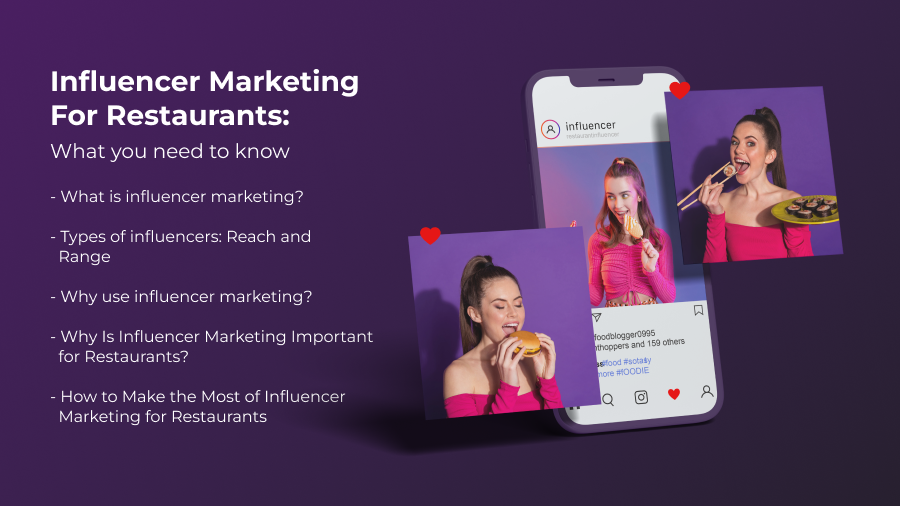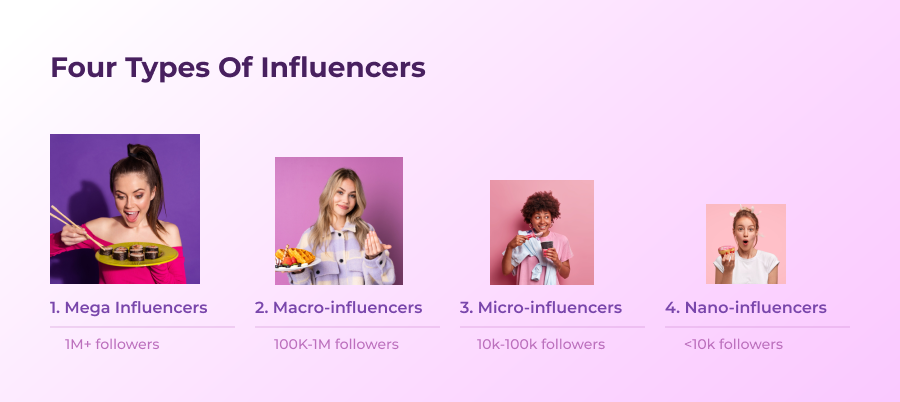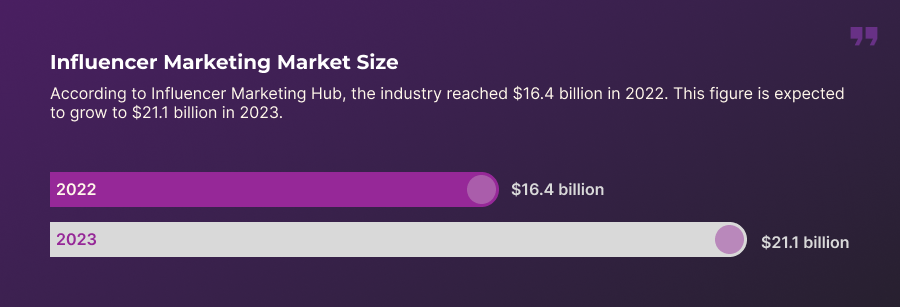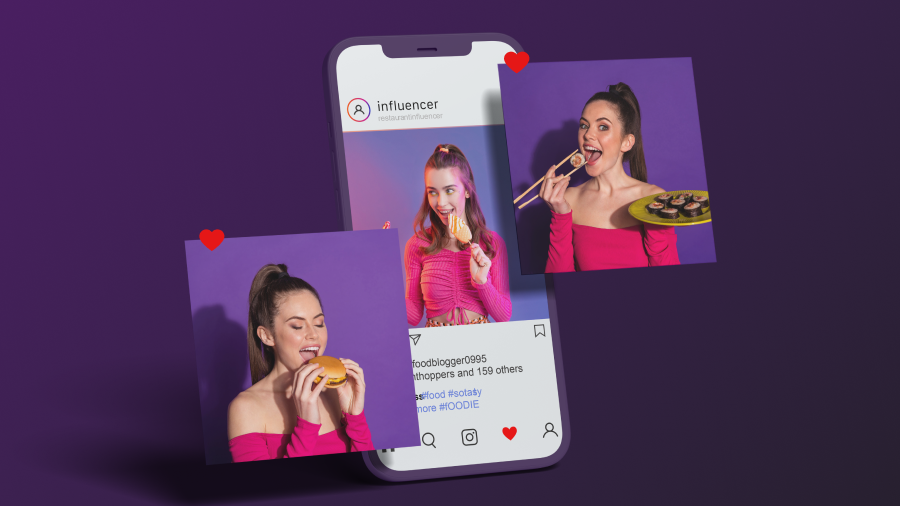Influencer Marketing for Restaurants: What You Need to Know
How do diners find new restaurants? Often, their favorite Instagram and TikTok influencers review special menus, attend grand openings, and collaborate with chefs. Influencer marketing has grown into a $21.1 billion industry, 29% more than last year's $16.4 billion. There is a great chance for restaurants to implement this strategy into their overall marketing mix.
Creative content creators will bring authenticity and creativity to your brand. But finding the right accounts to work with can be difficult, especially if you're new to the world of influencer marketing, but we're here to help.
Read on to learn more about influencer marketing, why restaurants should use it, and how to make the most of it.

This type of marketing relies on endorsements and product mentions from influencers, people who have a large social following and are considered experts.
Influencer marketing works because social influencers have a high level of trust among their followers. And their recommendations serve as a form of social proof for potential customers of your brand.
Types of influencers: Reach and Range
Partnering with an influencer with millions of followers may sound like a dream come true — but it may not be the best fit for your brand. Some social media influencers have a large, diverse following that spans different demographics. There are also smaller but more targeted and engaged communities.
Your brand's success depends on knowing what each type of influencer can offer in terms of reach, range, cost, and engagement.
Let's take a closer look at the types of influencers out there:

Why use influencer marketing?
Given that 56% of young Americans have purchased a product after seeing a post from someone they follow, influencer marketing can be an extremely potent marketing strategy for your brand.
According to the Influencer Marketing Hub, the sector will be worth $16.4 billion by 2022. This figure is expected to rise to $21.1 billion by 2023.

Why Is Influencer Marketing Important for Restaurants?
With so many different types of marketing and strategies to pick from, it can be tough to know where to start.
Influencer marketing is one marketing tactic to consider. This is a type of marketing that focuses on promoting your brand through influential leaders. There are various reasons why restaurants should use influencer marketing. To begin with, collaborating with influencers can help you reach a larger audience.
When an influencer recommends your restaurant on their social media channels, their followers will see your content and be more likely to visit your restaurant.
Furthermore, influencer marketing can help you build trust and a reputation. When a creator creates content about your restaurant, their followers will take it as an endorsement and be more likely to try your food.
Finally, this type of marketing can be less expensive than other marketing strategies. Once you've found your ideal influencer, you can agree on a fee based on their reach and engagement. This can result in a larger ROI than other marketing strategies, such as paid advertising.
How to Make the Most of Influencer Marketing for Restaurants
There are a few things to consider before partnering with an influencer as part of your restaurant marketing strategy.
You must first identify your ideal customer and then identify the right influencers who are already reaching out to them. Then collaborate with them to create content and measure its effectiveness in driving new business.
1. Know your ideal customer
Social media marketing for restaurants begins with knowing your target audience and understanding their social media habits. Who are they? What social media platforms do they exist on? What are they interested in?
The answers to these questions should start to match up with your ideal influencer. For example, if your ideal customer is in the 18–25 age bracket, you'd be better off targeting influencers on TikTok than on Facebook, as TikTok marketing for restaurants tends to target a younger audience.
2. Consider engagement rates as well as follower counts
Your chosen influencer might have a large number of followers, but are those followers engaging with their content? Influencers can have a large number of followers but a low interaction rate, or vice versa.
It is important to ensure that their target audience sees and interacts with the post; otherwise, your work and money could get wasted. Make sure to ask about your influencer's post engagement, as well as their reach and impressions.
3. Establish specific, measurable targets for your influencer campaigns
Your influencer marketing activities should have specific goals as part of your social media marketing strategy.
There are so many stories out there about people getting fantastic success through influencer marketing that it's easy to think you'll get the same. However, each influencer is different, and each has a unique audience that responds to different types of content.
Set specific goals and objectives so that all parties know what is expected from each other. This way, you'll know exactly what to expect, and the influencer will know exactly what they need to do to ensure you're happy with your investment.
Before you begin reaching out to influencers, you should have a clear idea for your influencer marketing strategy.
Do you want to boost brand awareness?
Drive traffic to your website?
Improve sales?
You'll be able to identify the influencers who can help you reach your goals if you know what they are.
4. Understand your restaurant influencer marketing budget
Budgets for influencer campaigns vary. Some may promote your company by reviewing your product in an exchange called gifting. This is when you send your product to influencers for free, with no obligation for them to review it.
Some may charge a set fee per post or per story post, regardless of how much free product you offer. Consider how much you want to spend/how many products you want to give away and make the best decisions for you, your brand, and your budget.
5. Develop your influencer relationships
To get the most out of your influencer campaign, see your influencer as a partner brand rather than a person with a following. Your influencer has a responsibility to be real and engaging to their following, and you have a responsibility to achieve the goals of your restaurant business.
Create a win-win situation with your chosen influencer so that your success is linked to theirs and you are more likely to see the results you desire. This can help you build a relationship with your influencer, which may lead to more successful campaigns in the future.
6. Keep track of your campaigns
Track the performance of your efforts to see whether your spending on influencer marketing is worthwhile. This entails knowing which customers purchased from you as a result of your campaigns.
There are several ways to accomplish this. You can build tracking links that incorporate code that shows you where the customer came from. Alternatively, you can generate discount vouchers that your influencers can give out to their followers. When they check out on your online ordering site or app, they can enter the code to earn a discount, and you can add that sale to the total.
To calculate the ROI, or return on investment, of your campaign, compare the total revenue gained to the influencer marketing budget.
Influencers are here to stay, but the world of influencer marketing has transformed dramatically in a short period of time, and it may look and operate very differently in five years than it does today. This article will help you get started with developing your plan, but like with any social strategy, you must be prepared for change.
Influencer marketing has its own special considerations, but the process is the same as other marketing: research, create a budget, determine goals, find your influencers, then review and revise. Once you've established a rhythm, you can find yourself developing new forms of influencer marketing campaigns.
Find this interesting? Check out Restaurantify to discover more strategies for running a successful restaurant business.

